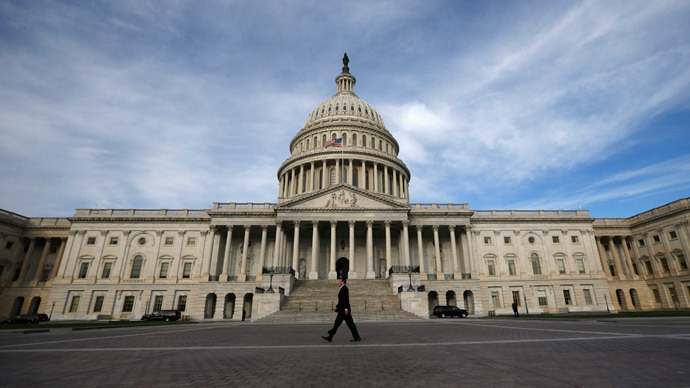Anti-spying NSA bill wins first round in US Congress

The House Judiciary Committee voted 32-0 to advance legislation that would put a halt to the National Security Agency’s controversial bulk collection of internet and telephone records, exposed last year by whistleblower Edward Snowden.
Amendments to the USA Freedom Act aim to block the NSA’s ability
to siphon and store the so-called metadata on domestic and
international communications, instead keeping the information in
the hands of telephone and internet companies.
Under the provisions of the bill, the NSA would be required to
prove to the courts that an individual is somehow connected with
terrorism before it could gain access to their personal
information.
The bill reflects recommendations forwarded last year by a
presidential Review Group that advised the NSA to stop pressuring
tech companies to put “back doors” into their programs, which
gives the NSA unfettered access to customers’ records.
Under the NSA’s so-called PRISM program, which former NSA
contractor-turned-whistleblower Edward Snowden revealed last year
to intense international condemnation, the NSA collects and
stores numbers dialled and call times but does not record the
conversations.
However, even that claim of limited powers was challenged in
March after it was reported that the NSA operates another
program, dubbed MYSTIC, that gives it the power to “retrieve
audio of interest that was not tasked at the time of the original
call,” according to The Washington Post.
However, records at the time said the NSA is able to
retrieve the audio communications from "just one country."
Vindication for Snowden?
Human rights groups cheered the early victory, hoping it puts the
brakes on the NSA’s global surveillance system that took many
people by surprise.
"This is a historic turn of events in our government's
approach to counterterrorism policies," Laura Murphy,
director of the American Civil Liberties Union's Washington
Legislation Office, said in a statement.
Bipartisan support of the bill suggested there was enough public
demand for the legislation.
“The bottom line is the amended [USA] Freedom Act makes it
crystal clear that Congress does not endorse bulk collection and
ensures Americans’ civil liberties are protected,” said Rep.
F. James Sensenbrenner Jr. (R-Wis.), co-sponsor of the bill, the
Washington Post reported.
Now that the issue of NSA surveillance has gained forward
momentum in Congress, it will be taken up next by the House
Intelligence Committee, which has been kicking around its own NSA
bill, entitled “FISA Transparency and Modernization
Act,” before moving on to the Senate Intelligence Committee,
which last year expressed support of the existing NSA program.
The irony of the Senate Intelligence Committee expressing its
support for NSA surveillance of ordinary citizens was revealed in
March when Senator Dianne Feinstein, who chairs the Intelligence
Committee, was infuriated when it was discovered that the CIA was
conducting surveillance of her staff.
"I have grave concerns that the CIA search may well have
violated the separation of powers principles," Feinstein
said in a speech on the Senate floor. "I am not taking it
lightly."
Snowden, speaking with NBC reporters from his Russian exile, said
he found it ironic that Feinstein “does not care at all that
the rights of millions of ordinary citizens are violated by our
spies, but suddenly it’s a scandal when a politician finds out
the same thing happens to them."
Feinstein, a Democrat, has been a staunch advocate of spying
programs as a necessary weapon in the fight against terrorists.
As for scaling back the powers of the NSA, should Congress fail
to pass a bill into law this year, the provision underlying the
NSA phone records collection (Section 215 of the USA Patriot Act)
will expire in June 2015.
At that point, it will then be up to Congress and the president
to decide whether to renew the legislation.














